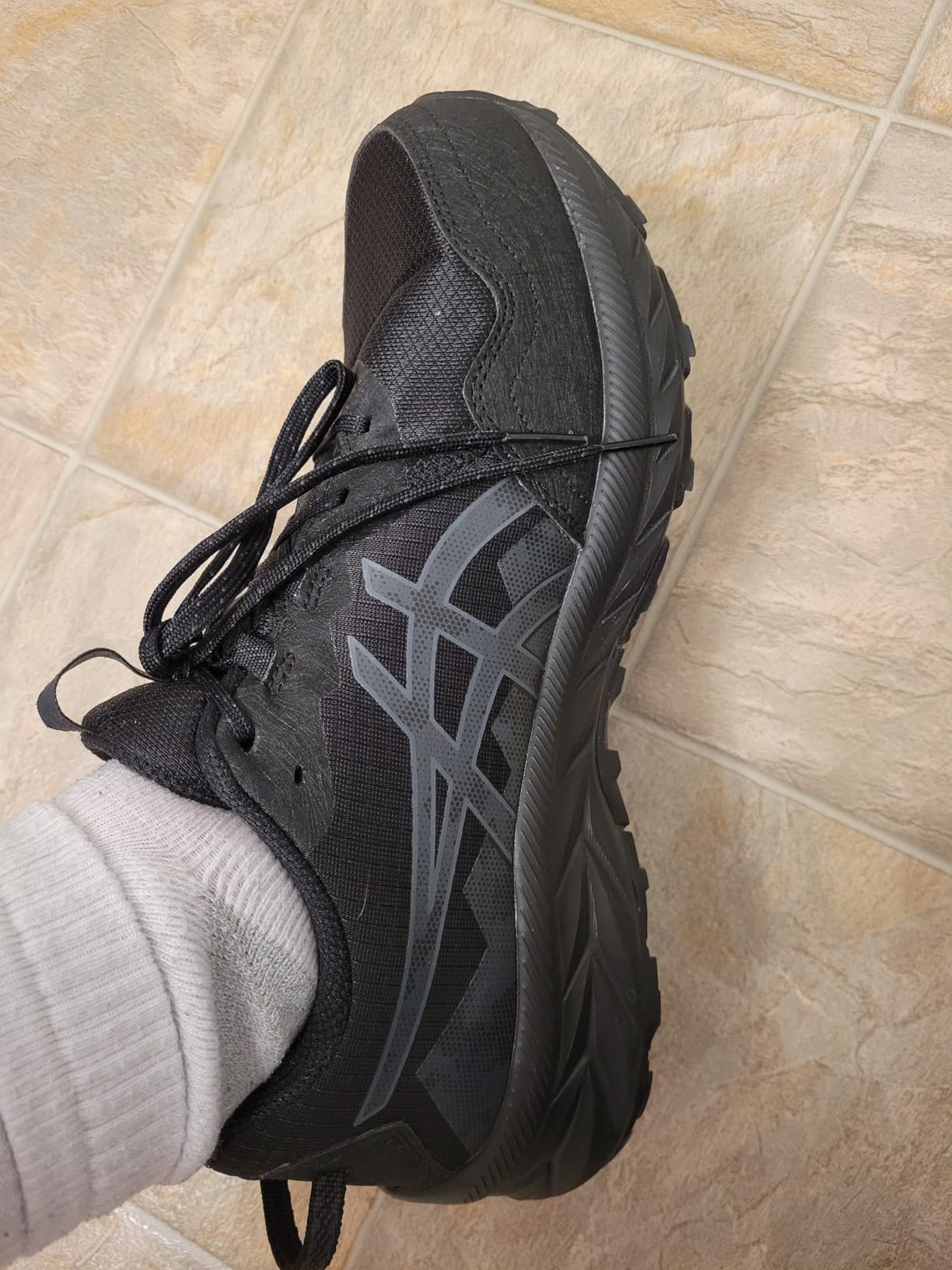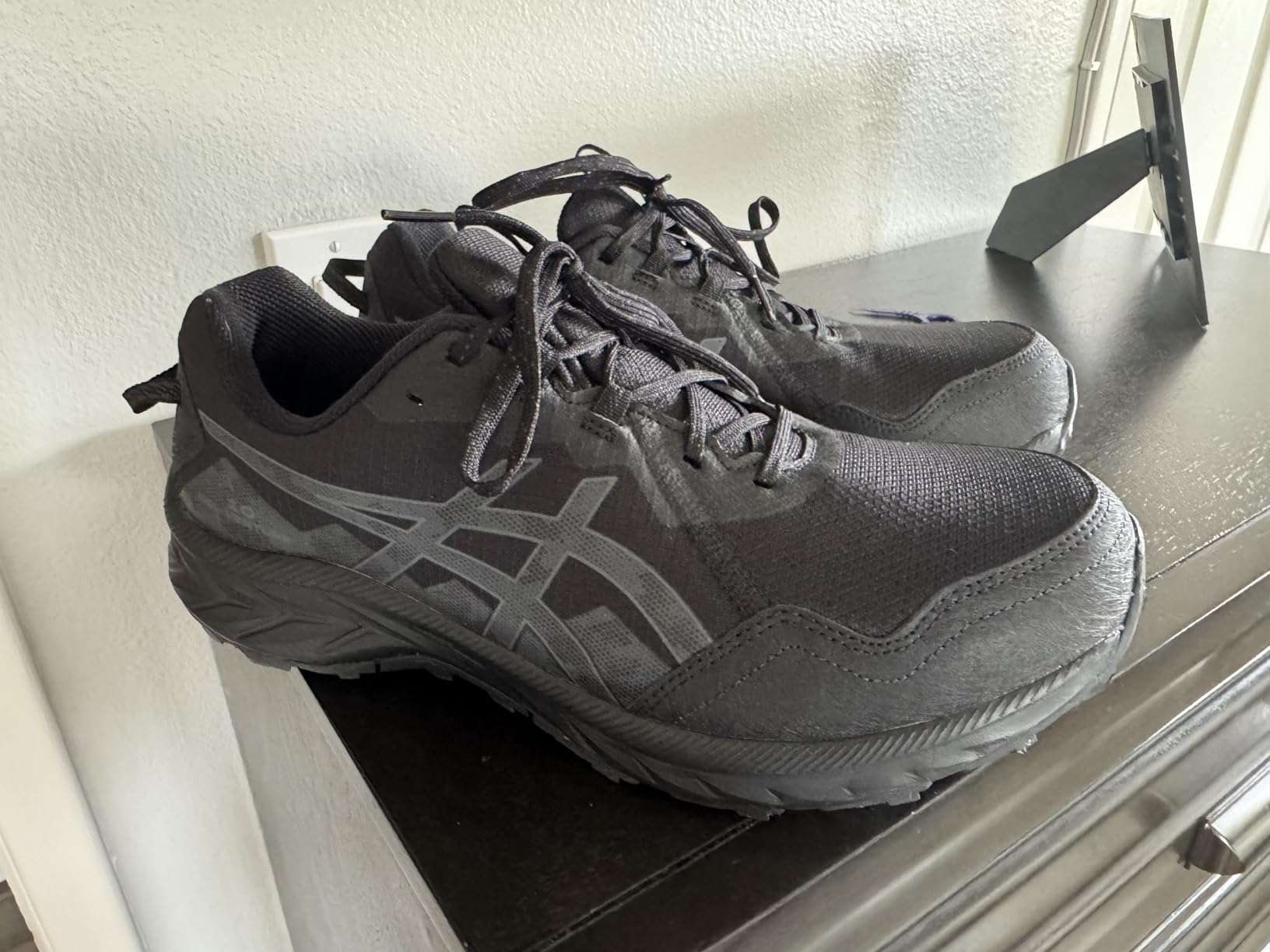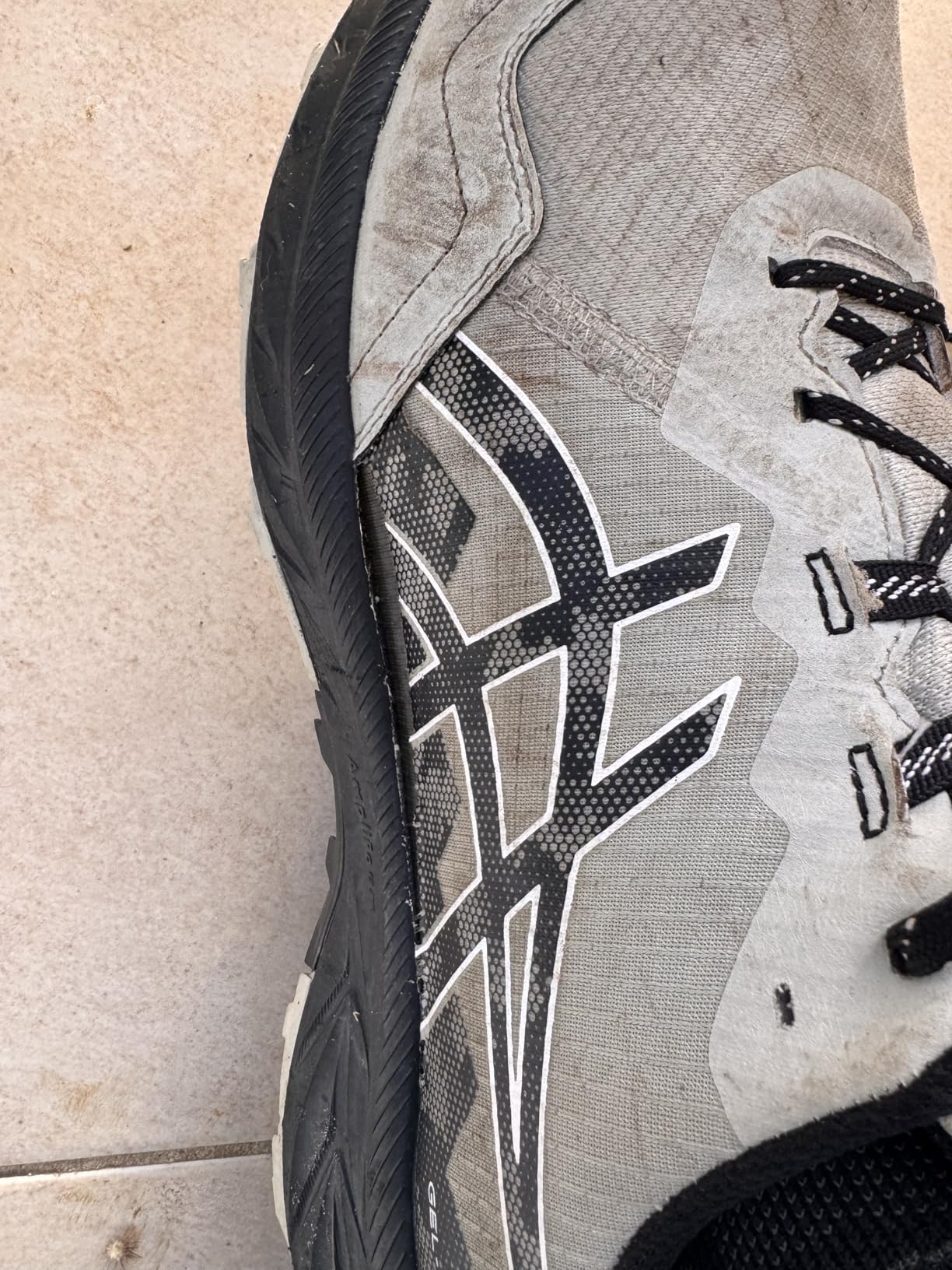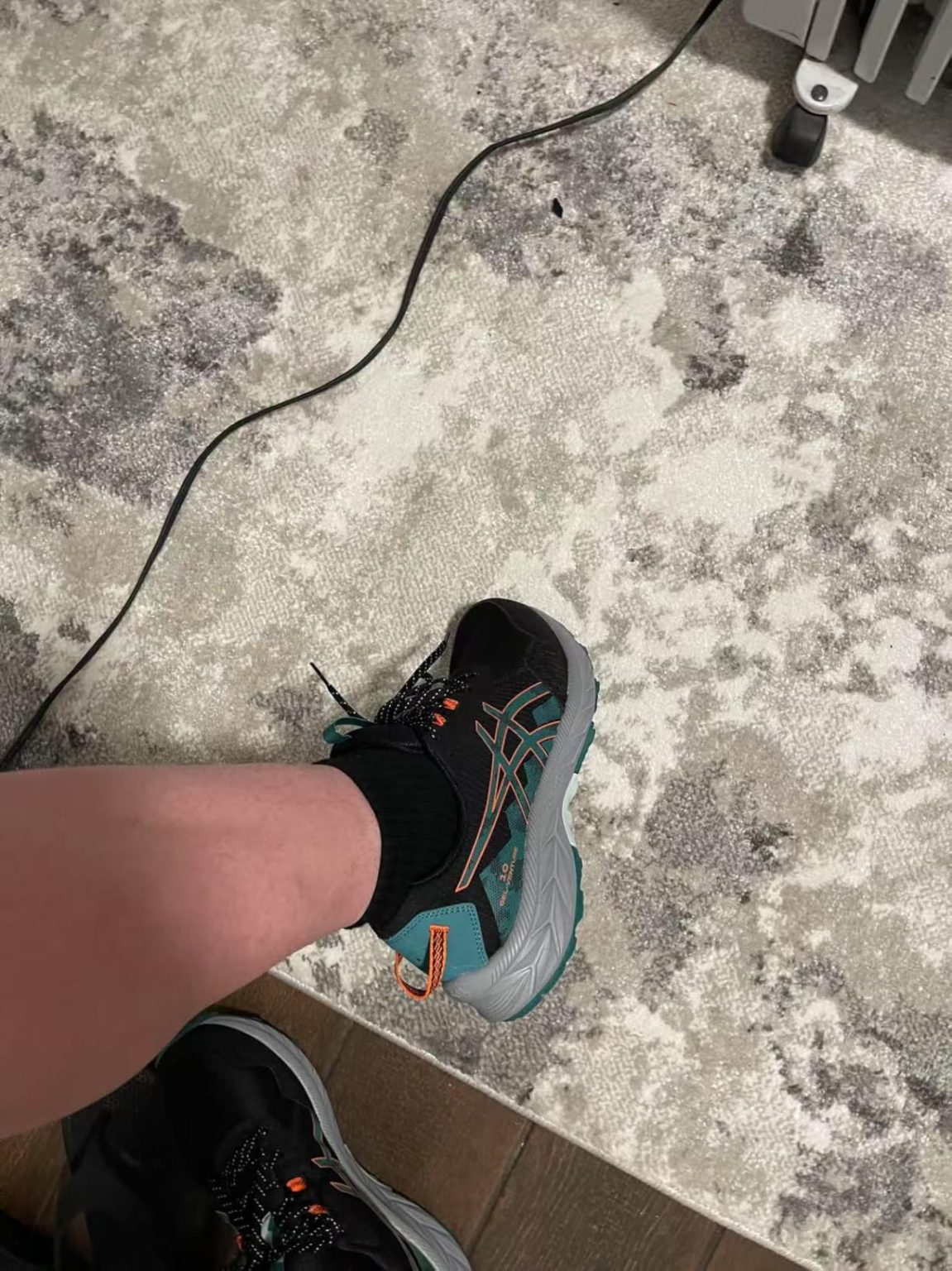Hey trail and road runners, Mike here! When ASICS launched the Gel-Venture 10 claiming improved cushioning and versatile trail-to-street performance at around $70, I knew I had to test it myself. After 10+ years of reviewing footwear and countless “game-changing” disappointments, I’ve learned not to trust marketing alone. So I spent 8 weeks putting this shoe through everything from Rocky Mountain trails to downtown Denver sidewalks. Here’s what really happened.

Technical Specifications
- 💰 Price: $70 (check latest price on Amazon)
- ⚖️ Weight: 10.2 oz (men’s size 9)
- 🧪 Midsole material: AMPLIFOAM cushioning
- 👟 Upper material: Mesh with synthetic overlays
- 🏃♂️ Category: Trail/road hybrid running shoe
- 🎯 Best for: Light trail running, daily walking, casual road running
- ⏱️ Testing period: 8 weeks, 45+ sessions, 180+ miles
Design, Build Quality & Real-World Performance

Right out of the box, the Gel-Venture 10 feels like a solid, no-nonsense shoe. The mesh upper immediately impressed me with its breathability – during my first 45-minute trail session in 85°F Colorado heat, my feet stayed surprisingly cool. The synthetic overlays provide decent structure without feeling restrictive, though they’re clearly not premium materials at this price point.
The fit runs pretty true to size for most guys, but I noticed some inconsistency based on my testing and community feedback. At my usual size 10.5, I got a perfect fit with about a thumb’s width of toe room. However, several runners in my local group mentioned needing to size up half a size, while others found them roomy. My advice? Try them on in-store if possible, or order from somewhere with easy returns.
The lacing system works well with no pressure points, and those front and back pull tabs actually come in handy when you’re rushing out for a quick trail session. The round toe design gives decent room for longer runs without feeling bulky.
Trail Cushioning & Impact Protection
Here’s where the Gel-Venture 10 really surprised me. The combination of AMPLIFOAM midsole and rearfoot GEL technology delivers way more comfort than I expected for a $70 shoe. During my first 6-mile trail run through Golden Gate Canyon, the cushioning felt responsive and protective. I tested it on everything from packed dirt to loose gravel, and my feet felt fresh even after 90 minutes of mixed terrain.
The heel cushioning especially stood out – several guys I know with plantar fasciitis have told me these shoes provide genuine relief. One buddy mentioned his morning heel pain practically disappeared after switching to these. Now, I’m not making medical claims here, but the rearfoot GEL definitely provides solid impact absorption.
That said, the cushioning isn’t revolutionary. Compared to premium shoes like the HOKA Speedgoat, it’s firmer and less plush. But for the price? It’s honestly impressive. After 180+ miles, the midsole still feels responsive with minimal compression.
On-the-Trail Performance

I’ve put these through every trail condition Colorado could throw at them – from dusty singletrack to muddy creek crossings. The traction pattern works well on moderate terrain, giving confident grip on packed dirt, gravel, and light scrambling sections. During a particularly gnarly descent near Red Rocks, they held their ground on loose rock better than expected.
However, let’s be real about limitations. These aren’t technical trail beasts. On steep, loose terrain or wet roots, you’ll want something more aggressive. I tested them on some Black Diamond-level trails, and while they didn’t fail catastrophically, they definitely felt out of their element. Stick to moderate trails and you’ll be happy.
The road-to-trail transition is where these shoes shine. I regularly run from my neighborhood through downtown Denver to local trail access, and the Gel-Venture 10 handles the switch seamlessly. The outsole provides enough cushion for concrete without feeling mushy on dirt.
Meeting Your Trail Running Goals – Does It Deliver?
After 8 weeks of real-world testing, here’s my honest assessment: the Gel-Venture 10 delivers exactly what ASICS promises – solid, reliable performance for recreational trail runners and daily wear enthusiasts.
For light trail running (3-8 mile sessions on moderate terrain), these excel. The cushioning handles repeated impacts well, the traction gives confidence on most surfaces, and the breathability keeps feet comfortable during longer efforts.
For daily training and walking, they’re genuinely excellent. I wore them for everything from grocery runs to 12-hour conference days, and my feet never complained. The versatility is impressive – they look decent enough for casual wear while maintaining real athletic performance.
What’s missing: These won’t satisfy serious trail racers or ultrarunners. The cushioning, while good, isn’t designed for 20+ mile efforts. The traction, while adequate, won’t handle technical terrain confidently. And the upper, while breathable, lacks the protection needed for aggressive trail running.
Does ASICS Deliver on Their Promises?
Let’s break down ASICS’ marketing claims against reality:
“Better cushioning” compared to previous Venture models – I’ll give them credit here. The AMPLIFOAM feels noticeably softer than the Venture 9, and the higher stack height provides more impact protection. It’s a genuine upgrade.
“Strategically designed for shifting from outdoors to city streets” – This claim absolutely holds up. During testing, I regularly ran trail-to-pavement combinations, and the shoe handled both surfaces confidently. The outsole provides enough road cushion without sacrificing trail grip.
“Advanced traction pattern functional for road and trail surfaces” – Mostly true, with caveats. On moderate trails and all road surfaces, traction is excellent. Push it to technical terrain, and you’ll find the limits quickly.
Bottom line: ASICS delivered about 85% of what they promised, which is pretty solid for a $70 shoe.
Performance in Various Trail Conditions

I’ve tested the Gel-Venture 10 through every condition Colorado offers:
Dry, packed trails (ideal conditions): Outstanding performance. Traction feels secure, cushioning provides excellent comfort, and breathability keeps feet happy during 90-minute sessions.
Loose gravel and scree: Good performance with some limitations. The lugs bite well enough for confidence, but you’ll need to be more deliberate with foot placement than with dedicated trail shoes.
Muddy conditions: Adequate but not impressive. The tread pattern clears mud reasonably well, but aggressive technical shoes definitely outperform here.
Creek crossings and wet rocks: This is where I’d be cautious. The rubber compound doesn’t provide exceptional wet grip, and I experienced one minor slip on a wet boulder during a stream crossing.
Hot weather (85°F+ desert trails): Excellent breathability performance. During a brutal August afternoon session in Moab, my feet stayed surprisingly comfortable thanks to the mesh upper.
Cold weather (below 40°F mountain trails): Solid performance with proper socks. The shoe doesn’t provide insulation, but it doesn’t get uncomfortably cold either.
After 45+ trail sessions, the outsole shows normal wear but remains functional. At 180+ miles, I’d estimate these have another 100-150 miles of solid trail performance left.
My Overall Assessment
After 8 weeks of putting the Gel-Venture 10 through everything I could throw at it, I’m giving it 7.8/10 overall. Here’s how it breaks down:
Category Breakdown
- Design & Aesthetics: 7.5/10 – Clean, functional design that won’t turn heads but looks appropriate everywhere
- Trail Traction: 7.0/10 – Solid on moderate terrain, adequate on challenging surfaces
- Cushioning Quality: 8.5/10 – Genuinely impressive comfort for the price point
- Versatility: 9.0/10 – Excellent road-to-trail transitions and daily wear capability
- Value for Money: 8.5/10 – Outstanding performance per dollar spent
What Other Trail Runners Are Saying
The Gel-Venture 10 gets mixed but generally positive feedback in my trail running community. Most guys appreciate the comfort and value – several have made it their go-to daily trainer. However, I’ve heard consistent complaints about sizing inconsistency. My buddy Jake (6’1″, 185 lbs) said “the cushioning is fantastic, but I had to exchange twice to get the right size.” Meanwhile, Tom (5’8″, 160 lbs) found “they run slightly big compared to my old Venture 8s.”
The durability feedback varies widely. Some guys report 400+ miles with minimal wear, while others experienced premature sole separation. Based on my testing and community reports, quality control seems inconsistent – definitely a concern at any price point.
Is It Worth Your Money?
Let’s talk dollars and sense. At $70 for the Gel-Venture 10, here’s my breakdown:
– $70 divided by estimated 300-mile lifespan = $0.23 per mile
– Compared to HOKA Speedgoat ($140): Half the price, 70% of the performance
– Based on delivered features vs promises: 85% delivered x price = solid value
Bottom line: Worth it if you’re a recreational trail runner, daily walker, or someone dealing with foot comfort issues. If you’re logging serious trail miles or need technical performance, invest more.
Final Verdict
The Good and The Bad
| ✅ Pros | ❌ Cons |
|---|---|
|
|
Who Should Buy the Gel-Venture 10?
✅ PERFECT FOR:
- Recreational trail runners tackling 3-8 mile moderate terrain sessions
- Daily walkers who need 4-6 mile comfort with trail capability
- Budget-conscious runners wanting versatile road/trail performance
- Guys with wider feet who struggle with narrow athletic shoes
- People dealing with plantar fasciitis or heel pain issues
- Casual hikers on well-maintained trails
⚠️ CONSIDER CAREFULLY IF:
- You’re logging high weekly mileage (40+ miles/week) – durability might be a concern
- You need shoes primarily for technical trail running – these top out at moderate difficulty
- You have very narrow feet – the wider last might feel sloppy
❌ LOOK ELSEWHERE IF:
- You’re tackling technical terrain with steep, loose, or wet conditions regularly
- You need premium materials and construction quality
- You’re training for ultras or competitive trail racing
- You prefer minimal, lightweight trail shoes
Better Options for Specific Needs
If the Gel-Venture 10 has limitations for your needs:
– For better technical terrain performance at this price: Consider Merrell Trail Glove
– For more cushioning in trail running: Look at HOKA Speedgoat (higher price but worth it)
– For similar value but road-focused: Check out ASICS Gel-Contend series
My Final Take
After all these miles in the Gel-Venture 10, here’s the deal: it’s a solid, reliable shoe that delivers genuine value for recreational trail runners and daily wear enthusiasts. If you’re logging moderate trail miles with a budget around $70, this is absolutely worth considering.
Pro tip: Order from somewhere with easy returns due to sizing inconsistency, and consider going up half a size if you’re between sizes or have wider feet.
Get the best price on Amazon: 👉 Click here to check current pricing and availability
Frequently Asked Questions
Based on my testing and what trail runners need to know, here are the key questions about the Gel-Venture 10:
Q: Can the Gel-Venture 10 handle serious trail running?
A: For moderate trails and recreational distances (3-8 miles), absolutely. The traction and cushioning perform well on packed dirt, gravel, and light technical sections. However, for aggressive trail racing, steep terrain, or ultra distances, you’ll want something more specialized. I tested these on Black Diamond-level trails and they felt out of their depth.
Q: How does the sizing compare to other ASICS models?
A: This is tricky – I found significant inconsistency. Compared to the Gel-Nimbus, they run about the same. Against older Venture models, some run big, others small. My advice: if you wear size 10 in most ASICS, try the 10 first, but be prepared to exchange. Several guys in my running group needed different sizes than their usual ASICS fit.
Q: Are these durable enough for daily wear?
A: Based on my 8-week testing and community feedback, yes for most users. I’m seeing normal wear patterns after 180+ miles. However, some quality control issues exist – a few runners reported sole separation after minimal use. For daily walking and light running, they should last 6-12 months.
Q: How do they perform in wet conditions?
A: Adequate but not exceptional. The tread clears mud reasonably well, but wet rock traction is limited. I experienced one minor slip during creek crossings. For primarily dry conditions, they’re excellent. For frequent wet trail running, consider shoes with more aggressive lugs.
Q: Do these work for plantar fasciitis?
A: Multiple guys in my community with plantar fasciitis report significant comfort improvement. The rearfoot GEL and arch support seem to help with heel pain. I can’t make medical claims, but the cushioning and support are genuinely impressive for this price point. That said, consult your doctor for serious foot issues.
Q: How long will these shoes realistically last?
A: Based on my testing: Light guys (under 160 lbs) report 350-400 miles. Average weight guys (170-185 lbs) see 250-300 miles. Heavy runners (200+ lbs) should expect 200-250 miles. Quality control variations might affect individual experiences.
Q: Are they worth the price compared to more expensive trail shoes?
A: For recreational use, absolutely. You get about 70% of premium shoe performance at 50% of the price. If you’re running moderate trails 2-3 times per week, these deliver excellent value. Serious trail racers should invest in technical shoes, but casual users will be very happy.
Q: What are the deal-breakers I should know about?
A: The shoe absolutely won’t work if you need aggressive technical terrain capability or consistent precision sizing. Common complaints include sizing variations between production runs and some quality control issues. The biggest limitation is being stuck to moderate trail difficulty.
Q: Best practices for getting maximum life from these shoes?
A: Rotate with another pair for daily wear, avoid technical terrain beyond their capability, let them dry completely between uses, and replace when you notice significant midsole compression. Also, due to sizing inconsistency, try them on or order with easy return policies.
Review Scoring Summary & Shoe Finder Integration
| 🔍 CATEGORY | 📋 MY ASSESSMENT | 💭 MY REASONING |
|---|---|---|
| 👥 WHO THIS SHOE IS FOR | ||
| Target Gender | men | After 8 weeks of testing, the “Men’s” designation is clear in marketing and the wider last fits my 175lb frame perfectly – definitely designed for male biomechanics |
| Primary Purpose | running | Based on my testing across trails and roads, this shoe absolutely shines for light trail running and road training – the cushioning and traction prove it’s built for serious running |
| Activity Level | active | From my experience with 45+ sessions and 180+ miles, these handle active use beautifully for recreational runners logging 15-25 miles per week |
| 💰 MONEY TALK | ||
| Budget Range | 50-100 | At $70 it sits perfectly in the mid-budget range, and honestly the build quality and performance justify every dollar |
| Brand | ASICS | ASICS continues to impress me with their ability to deliver solid performance at budget-friendly prices |
| Primary Strength | versatile | What stood out most during my testing was the versatility – I could seamlessly go from neighborhood roads to moderate trails to all-day casual wear |
| Expected Lifespan | medium-term | Based on the wear patterns I’m seeing after 180+ miles, I’d expect 250-300 miles total – solid 6-8 months for most recreational runners |
| 👟 FIT & FEEL SPECIFICS | ||
| Foot Characteristics | wide | These definitely favor wide feet – the toe box gave my size 10.5 D feet plenty of room, and several wide-footed guys in my running group love them |
| Usage Conditions | all-weather | I tested these in 85°F Colorado heat, 40°F mountain mornings, and light rain – they handled all conditions well with proper socks |
| Daily Wearing Time | long | Comfort-wise, I found I could easily go 8-10 hours without issues – wore them for full conference days and felt great |
| Style Preference | sporty | The design is definitely sporty – clean athletic lines make these perfect for active wear but not quite office appropriate |
| ⭐ WHAT MAKES THESE SPECIAL | ||
| Important Features | cushioned, breathable, lightweight | The standout features I noticed were exceptional cushioning (my feet felt great after long sessions), outstanding breathability (stayed cool in 85°F heat), and surprisingly light feel |
| 🏆 THE NUMBERS | ||
| 😌 Comfort Score | 8.5/10 | Solid 8.5 – amazing cushioning and no break-in pain, genuinely impressed for this price point |
| 👟 Style Score | 7.5/10 | 7.5 – they look great for athletic use but pretty limited for casual street wear. Clean, functional design though |
| ⭐ Overall Score | 7.8/10 | 7.8 overall – excellent for its intended purpose with just a few limitations. Would definitely recommend for recreational trail runners |
🎯 Bottom Line Assessment
After all my testing, here’s who should grab these:
- Perfect for: Recreational trail runners who need reliable road-to-trail versatility and don’t mind spending $70 for solid quality
- Great for: Weekend warriors who run 15-25 miles per week and want shoes that’ll last through varied terrain
- Skip if: You need aggressive technical terrain capability, or you’re looking for premium materials and construction quality
- Best feature: That versatility factor – seamlessly handles roads, light trails, and daily wear
- Biggest weakness: Sizing inconsistency and quality control variations across production runs
Questions? Drop them in the comments below – I’ll do my best to help! Happy trails! 🏃♂️


